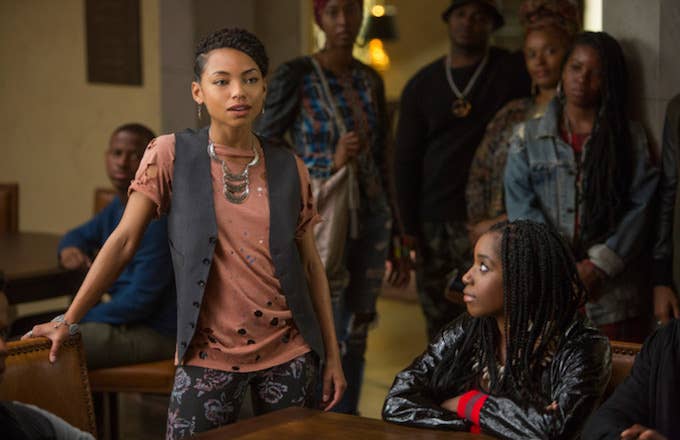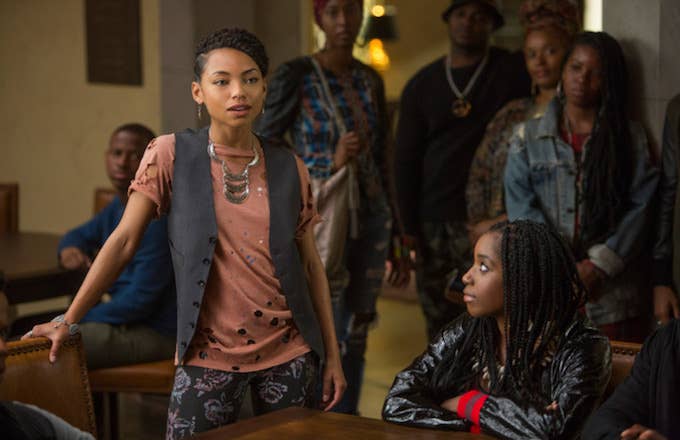
At a time when mental superiority is used as a security blanket, “woke” has become a pejorative. But it’s more than another four-letter word, it’s a mindset. It’s uttered often in the small-screen adaptation of Dear White People, wrapped in either outright contempt or self-important irony. And if you’ve seen creator Justin Simien’s 2014 film of the same name, you know this was by design. “Like many things in black culture, it starts off authentic, then becomes commoditized,” Simien tells Complex. “I don’t know that we were coming for the phrase exactly, but this idea of 'wokeness' is sort of a hard and fast, easy, Twitter-language way of describing yourself. And think of how inadequate it is to describe yourself and the [black] experience with one word. That definitely speaks to the heart of the series.”
The series, available today on Netflix, picks up where its predecessor left off. Over the course of 10 episodes, it addresses the warring perspectives of the black student body at Winchester University, an amalgamation of several Ivy League universities. On one end of the spectrum is Sam (Logan Browning, taking Tessa Thompson’s baton), the biracial agitator who atones for her good hair and light eyes through her activism. Joining her is the brooding Reggie (Marque Richardson), affectionately described by the perpetually-overlooked Joelle (Ashley Blaine Featherson) as “Dap from School Daze, but darker.” At the opposite end is Coco (Antoinette Robertson), née Colandrea, Sam’s foil who has carefully constructed a house of cards out of respectability politics for self-preservation. She clings to the chiseled arm of Troy Fairbanks (Brandon P. Bell), the junior politician who’s played Pinocchio to his father Dean Fairbanks’s (Obba Babatundé) Gepetto his entire life. The point of contention, at all times, is the proper way to be black in public.
Identity politics is the hidden curriculum at every institution of higher learning. The most valuable lessons learned aren’t found in textbooks, they’re introspective. Dear White People’s characters are searching for themselves, and their paths to self-discovery—like those of many undergrads—are occasionally hilarious and eyeroll-inducing. The need to assert “blacker than thou” maxims or condescend about efficiently navigating white spaces is a result of America’s racial dynamics. The competition for Winchester’s invisible black crown is a condensed look at how people with extremely ripe wisdom, regardless of how smart they think they are, prepare for the obstacle course beyond campus: the real world.
America the beautiful has turned social awareness into a material possession. It’s a crutch some use to make themselves feel better, and blacker, than the next person. It’s also the undercurrent of many a Dear White People face-off, and, according to Simien, this is common with the highly-flammable subject of identity.
“The truth of the movie and the show is identity versus self,” he explains. “When you’re part of a society where you’re constantly having to define your identity and sort of negotiate with what the mainstream culture thinks you are, you have less energy and time to figure out who you are when you go home at night. We were kind of set up in this society to constantly be defining ourselves, and I wanted to show how these kids—who are kind of in the middle of trying to make change on their campus—are trapped by that.”
Every episode of Dear White People focuses on this connection to identity: they’re character-specific to highlight the importance of perspective. “I wanted you to have feelings and judgements about characters through certain points of view, and when we finally get to their individual episode, that’s challenged,” Simien says.
The audience gets one look at who these characters are through public statements and arguments with each other, but their vulnerabilities are exposed under the microscope. Sam hiding her white lover, Gabe (John Patrick Amedori), is a metaphor for the white side she’s ashamed of. (“Her name is Sam White,” Simien says, emphatically.) Coco hates appealing to the white people she’ll never be seen as equal to. Troy grinds the demands of being everything to everyone into stress weed. For all of their strong convictions, these people aren’t finished products—they’re still in life’s chrysalis phase.
College students are works in progress. They change year by year, as they should, from style (Sam’s went from Whitley Gilbert to Freddie Brooks at the drop of a medallion) to school of thought. Aside from the collection of people in transition, Simien chose a college campus as the backdrop for Dear White People because it’s a hyperintense version of the rest of our lives. “For me, college was the perfect microcosm to talk about a really big topic,” he says. “If we really want to get into it, you can dissect an entire person’s life by discussing how identity played a part in being marginalized. If you don’t know who you are and what your major is, right now, you’re gonna be fucked when you graduate.”
What’s more, this allowed the creative braintrust to explore the discord between Winchester’s black students. Sam refers to a Black Caucus meeting, where they assemble to discuss issues plaguing the black student body, as a “completely masturbatory” pissing contest. It’s no different than a certain sect of Twitter and any forum where the matter of race is discussed internally. And it mirrors what happened during the fight for civil rights.
“We like to think of the ‘60s as Martin Luther King, Jr., and Malcolm X, and a little bit of friction—no, there were all of these different groups,” he says. “There was the Student Nonviolent Coordinating Committee (SNCC), the Black Panthers, Martin and Malcolm, but also the Whitney Youngs of the world, the Bayard Rustins of the world. We were completely divided on what to do. There were all of these leaders who couldn’t agree with each other, it’s part of human nature. We get caught in our little silos and end up working against ourselves. And I think social media culture really encourages that, because you’re really just shouting into a void hoping someone picks up on what you’re saying.”
Winchester’s Black Caucus wants the same thing: a safe space to blossom. They're battling the ignorance of blackface parties and the malevolence of the school’s administration, which is just a symbol for white supremacy. But the infighting and derision are what Simien calls “symptoms of oppression.” Peacocking to show authenticity or stepping on each other for a place in the Ivy League ivory tower are survival mechanisms developed to cope with a history of marginalization. But in doing this, Simien says, the black community hinders itself in ways white America does not.
“We’re ashamed of not being black enough, but white people never worry about not being white enough,” he explains. “They change their minds all of the time about who they are and what they want to be, but there’s something unique about the black experience where we feel like we have to build these fucking identities like tanks that we can never get out of just to survive.”
And it’s counterproductive when these identities attack each other, because it impedes a common goal. That’s why the blackness gymnastics on display in Dear White People—and in the real world—are ultimately fruitless. Anyone who’s actually “woke” would realize that.
Dear White People is a reminder that you don’t have to project a persona when you’re comfortable in your own skin. That external black pride doesn’t need to balance internal white guilt. That you don’t have to hide it beneath your wig or tuck it in to please your HNIC father, and that you can’t gauge it through a “Woke Or Not Woke” app. When the revolution goes public, there won’t be an IPO involved.
“I want you to care about the characters and empathize with them, but also see how they’re making mistakes,” Simien says earnestly. “To me, that’s what art is supposed to do: it’s supposed to make us look at things, laugh at ourselves, and wonder why the fuck we did that.” Mission accomplished.

